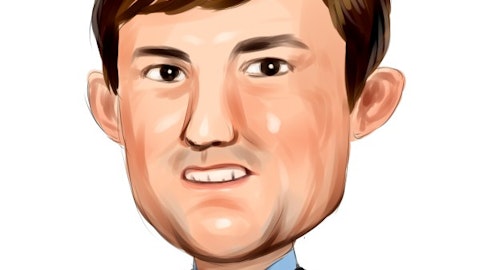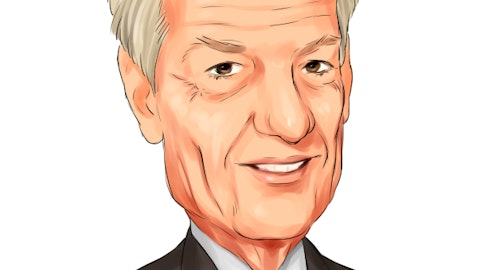Pierre Naudé: Yes. In the U.S. as I’ve mentioned, we still see strong demand. We see good pickup. You have to divide the U.S. in two segments. There’s a community regional, which had a little hangover from COVID because they were busy with PPP, plus coming back to the office, etc. We see some nice progression on that front and that market is performing well for us. On the enterprise side it’s more of a lumpy market, because its big deals and they only come so often. But if you look at overall the IT spend and the budgets we’ve heard so far, it looks very positive. However, as I mentioned earlier, there is a slight sentiment of caution creeping in, where people just take a little bit longer to make a decision or scrutinize it a little bit deeper, but we feel very good about the direction of the business.
I also firmly believe, in times like this that healthy companies with the benefit of being able to show they can be profitable and growing actually can keep our investment levels high on product as well as our sales and marketing. And as such, we are keeping our coverage of our SAM on a global basis in place. And as soon as these markets turn, nCino will be the brand that is known for their customer service, for the quality of innovation, as well as market coverage, and that’s how we plan to proceed.
Unidentified Analyst: Yes. Thank you for that, very helpful. I guess just a follow-up on the non-U.S. performance, I guess it’s really positive to see that you guys landed the deal with you know the Bank of New Zealand, and also the U.K. expansion deal seems impressive. But what are some other, I guess outperformance in Europe especially. Just any color that you could provide on the non-U.S. outperformance and any other like emerging areas, I guess?
Pierre Naudé: Yes. We see Asia Pacific is strong. South Africa is developing a nice market for us. Europe overall is going through a very difficult time. As you may know, the energy crisis or price increases there. The war of Ukraine is much of a real thing there. It’s not far away from the home front when you talk to the people. So there clearly is a psychological impact. There’s a level of conservatism creeping in. There’s a different regulatory emphasis in Europe, as well as ESG has a bigger role, and so all of these different factors is putting Europe a bit more in a conservative mode as far as we can see. We have optimized our organization there. We maintain the investments to keep the market coverage as we see these deals slowly moving forward. So we are committed to the continent, and I am pleased we’ve got marquee brand names there. And as that market loosens up, we will actually expand our footprint.
Unidentified Analyst : Yeah, that makes sense. Thank you very much.
Operator: Thank you. One moment for our next question. And our next question comes from the line of James Faucette from Morgan Stanley.
Unidentified Analyst: Hey everyone! It’s Michael for James. Thanks for taking our question. I appreciate there are a lot of moving pieces here, and you’re still a couple of months away in terms of your outlook formulation. But how should we sort of think about how conservative the directional commentary you provided on FY €˜24 was, particularly given it looks like loan growth is expected to decelerate from roughly 12% this year to almost half that next year? I just wanted to sort of pressure-test what you’re seeing in terms of the relationship to loan growth broadly.




